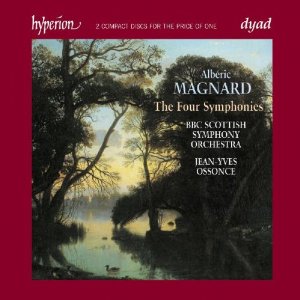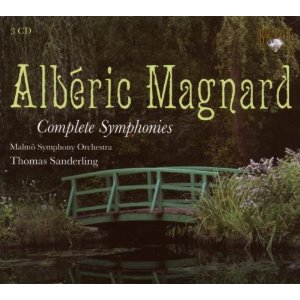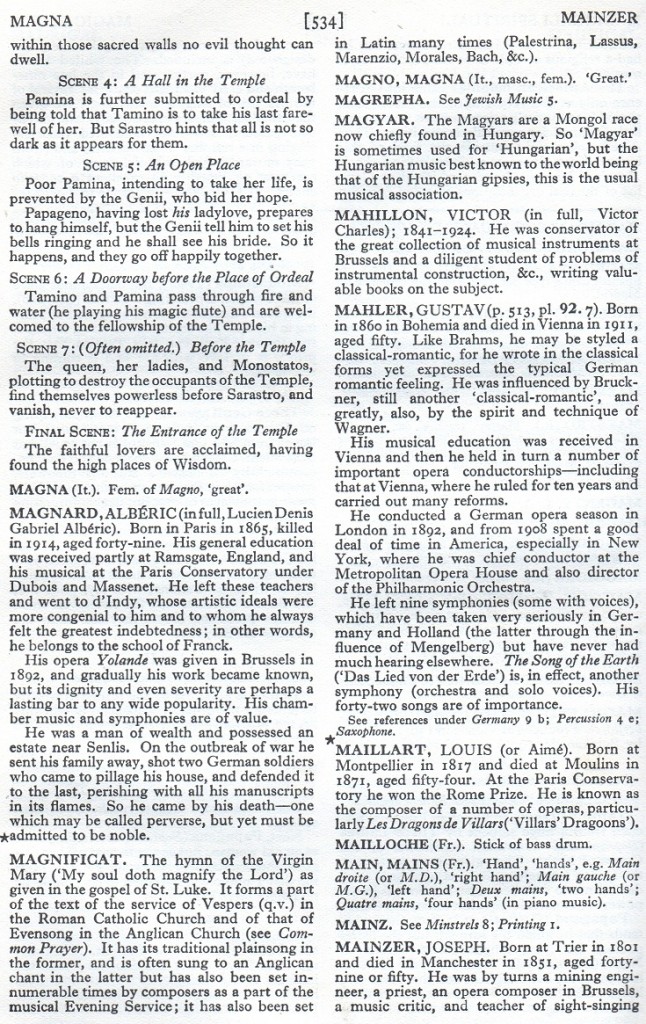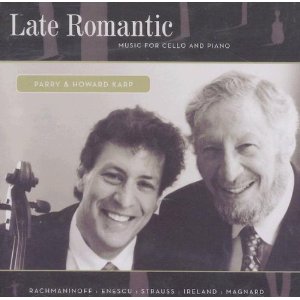One of my favorite guessing games this year is “who will be the next Mahler?”
The goal of this game is not to decide whether Schoenberg or Shostakovich was Mahler’s true musical heir (it’s likely they both thought they were). Rather, the question is over which composer will be the next to capture the sort of broad mixture of public adoration and critical admiration now enjoyed by Mahler. Bonus points for rising from obscurity.
It’s not just a matter of identifying the next most popular composer and waiting for them to catch up to Gus. After all, had one polled 1960’s listeners and asked them who would be the favorite of 2010’s listeners, I doubt Mahler would have been in the top 50. 1960’s era critics were busy assuring everyone that by 2011, Webern would be as popular as Brahms.
A friend recently recently sent me this page from the Oxford Companion to Music, fourth edition, published in 1942.
“He left nine symphonies, which have been taken very seriously in Germany and Holland, but have never had much hearing elsewhere.”
Mahler barely manages more space than Albric Magnard. It doesn’t look like Mahler was on anyone’s list for “most important composer in the universe after Beethoven” in 1942. Certainly not in Oxford.
Maybe Magnard is next? There are still a whole lot of fine composers out there whose music hasn’t been heard well or often enough for audiences and musicians to make up their minds on them.
As it happens, my friend Parry Karp has made the first recording of the Magnard Cello Sonata as part of a 2 disc set of late romantic era cello sonatas from Ireland, Magnard, Enescu, Strauss and Rachmaninoff. You can order it here, but click here for a short sample of the Magnard. Great stuff.
There are four Magnard Symphonies, which I was somewhat disappointed to find out have already been recorded. I’m hoping the existing recordings suck, so I have an excuse to do them (if they are good).


Okay, maybe Magnard is a longshot, but who is on your list? Shostakovich? Too obvious? Prokofiev? Too Russian? Copland? Not symphonic enough? Hans Gal? Too Woodsy?
Schnittke? Lutoslawski? Schumann? Schuman? Krenek? Rubbra? Debussy? Berio? Britten?
Maybe it will be Webern?
Please let us know your guess for the next king. Or queen.
Zwilich? Gubaidulina? Higdon?


If you guessed that I have both sets of the Magnard symphonies, you are correct. I’m sorry to inform you that the set conducted by Sanderling is bloody spectacular. The Ossonce is pretty good, too, but really, go to ArkivMusic right now and get the Sanderling. Great, great music. Magnard’s symphonies are all really cool, but the 1st and 4th in particular cry out for more performances. I’m positive that audiences would respond well to the 1st…it has everything you look for in a crowd-pleasing work, including one of the most gorgeous slow movements out there, and a really cool, borderline schmaltzy ending. The 4th is a lot denser musically, but it really is as perfectly crafted as anything anyone else ever wrote, Beethoven excepted of course. Plus, Magnard has arguably the greatest composer death of all-time: when German soldiers entered his home during WWI, he busted out of his upstairs study and opened fire on them, killing at least one and wounding others; they ended up burning his house down with him and his music (including the scores to two operas) in it. Sad, but also totally bad ass.
As for the actual question, I’d break it down into three possible solutions…
1) OBSCURE COMPOSER WHO WILL COME FROM COMPLETELY NOWHERE TO BE KING
Zimmermann…the more I hear of Zimmermann, the more I realize that no one captured the 20th century better. I doubt that a modern (being a relative term) composer could ever really reach the top universally, but he’d be my best guess
2) TOTALLY FAMOUS COMPOSER WHO WILL GO FROM BEING POPULAR TO BEING KING
Barber…diverse enough output to be heard in a variety of places, already has a piece that everyone in the galaxy knows, and several more that are also popular. Tonally approachable enough to please the masses.
3) THE ACTUAL ANSWER
Somehow, and I don’t know how just yet, it’ll be Mozart. Dammit.
Erik!
I hate you, because I bought the Ossonce, and now have to buy the other one, too. Why could they not both suck? So unfair.
Actually, the Magnard story has me primed for an all-time top 10 composer deaths blog. It may take more research than I can manage.
Mozart? Haydn!
Please invite me to be a guest blogger on that one, because I love stuff like that. I personally think Magnard’s is gonna be tough to top, although Webern (stepping outside to smoke a cigar so as not to wake his grandkids and being shot by an Army soldier) and Purcell (locked outside of his house by his wife after being out drinking, at least according to legend) might have a case.
I would suggest you also mention Hans Rott’s demise, but make sure you don’t use any vowels when you do…Hans Rott once wrote a letter to a friend that used vowels, and you don’t want plagiarism charges being bandied about.
I think that Shostakovich has arrived. Over the last 30 years he has become totally mainstream, and within five years we will have giant celebrations, though, hmm, I guess we have not yet had the GIANT FESTIVALS.
Just wait, though.
And I’m going to get Sanderling’s Magnard, for sure.
Lully is certainly in the all-time composer death hall of fame, especially since he died of a conducting related injury-
“On 8 January 1687, Lully was conducting a Te Deum in honor of Louis XIV’s recent recovery from illness. He was beating time by banging a long staff (a precursor to the bâton) against the floor, as was the common practice at the time, when he struck his toe, creating an abscess. The wound turned gangrenous, but Lully refused to have his toe amputated and the gangrene spread, resulting in his death on 22 March. He left his last opera, Achille et Polyxène, unfinished. His two sons Jean-Louis Lully and Louis Lully also had musical careers at the French court.”
from Wikipedia (so you know it must be true)
Chausson?
“When only 44 years old, Chausson died in Limay, Yvelines, as a result of a freak accident. While the whole affair remains somewhat mysterious, it appears that he lost control of the bicycle he was riding on a downhill slope, ran straight into a brick wall, and perished instantly. He was buried in Père Lachaise Cemetery in Paris. A small park called Place Ernest-Chausson in the 17th arrondissement of Paris is named in his honor.”
Many think it was suicide- his best music certainly dares to peer into the abyss. Tragic, but certainly spectacular composer death.
Of course, Alban Berg died from a bug bite.
“Berg died in Vienna, on Christmas Eve 1935, from blood poisoning apparently caused by an insect-sting induced carbuncle on his back. He had been reduced to near-poverty and it is said that to save money his wife performed an ill-advised home surgery using a pair of scissors. Later he was rushed to hospital, but too late to prevent the onset of blood poisoning. He was 50 years old.”
I was unaware of the Chausson…that one instantly rises close to the top.
Another one to consider, not in terms of the death itself but all that surrounds it, is Prokofiev, who has probably the most profoundly heartbreaking funeral story imaginable.
Gesualdo murdered his wife and her lover, then hung their bodies outside the house for all to see. Then it is possible he murdered his baby son because he doubted his paternity and probably murdered his father in law, who came to avenge the murder of Gesualdo’s wife.
Even more exiting, new research suggests Gesualdo himself was finally murdered by his second wife.
“Korngold- got to be. Hugely enjoyable, bursting with melody and emotion, hugely influential but still not QUITE there with the general public and treated with snobbish disdain by older critics (though increasingly, only the real dinosaurs). Just like Mahler was 30-40 years back. If even one of his pieces really catches on – on an advert or a film – he’ll be unstoppable. And not before time, too!”
I am definitely less experienced that most who have commented, but I have attend concerts regularly for 50 years. Last week I heard Lutoslawski’s Livre pour Orchestra (sp?) with Gunter Herbig conducting the Dallas Symphony. It made me want to hear that piece again, and more of his work…. I found the aleatoric sections fascinating, esp the last longer section….
I think Lutoslawski is definitely on the rise – he certainly is the talk amongst composition circles these days, and especially his early and late period combine a strange approachability with an absolutely virtuosic command of new orchestral colour.
I really hope Schnittke gains more prominence too. Beginning to love his music.
And although he is a little self indulgent and will probably never catch the modernists’ eye, Kancheli has certainly enchanted audiences over the past few decades.
I don’t know whether either will rise to Mahlerian prominence, but there are two works which have impressed me greatly to the point of mild addiction; Suk’s Asrael Symphony which has Mahlerian scope and resolves its tussle with angel of death with visionary calm. I also love Karlowicz; a Polish late-Romantic who died in a skiiing accident aged just 33 in 1909. His tone-poem Stanislaw and Anna Oswiecim is to die for. There is an excellent recording by the BBC Philharmonic (just returned safely from Japan) under Tortelier for Chandos. Had he not been a Pole, had he not died young, had he not become disenchanted with musical life….what might have been????
I’d like to say Franz Schmidt but I think I’m deluding myself. I love his music but it’s played – at least in the UK – so rarely that no one ever gets the chance to appreciate it.
I’m also a fan of Perry Karp and have his recording of the Magnard. That said, the Magnard had been available on CD in several performances for almost two decades by the time Karp’s UW recording came out in 2005.
Many outstanding symphonies were written between 1890 and 1950. Standards were high. For many people, Mahler became more than the composer of “Das Lied” through the efforts of Leonard Bernstein. It isn’t that Walter, Klemperer, and others didn’t conduct wonderful performances. But Bernstein was contemporary, Mahler turned him on, and the result was combustable. I suggest you look for one of the many fine but lesser-known composers who similarly turns _you_ on rather than try to calculate who the winner of the next horse race will be. If it’s Gal, more power to you.
Hi Chris
Great to hear from a fellow Karpian (note that it’s Parry with and “a”, not Perry with an “e”, though). I”ll have to check out the other Magnard recordings you mention. It’s a lovely piece.
I doubt Gal could be the next king. Much as I love his music, I think it is essentially too private and and personal to satisfy the kind of need for cathartic shared experience that Beethoven and Mahler offer.
Thanks for reading and getting in touch.